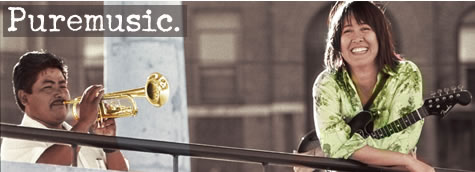 |
|
Michelle Shocked: Hi Frank, it's the very late Michelle Shocked, calling to talk with you.
Puremusic: Not so late. Are you doing phoners today?
MS: Well, I have a couple. I got distracted because my father called; we're in Dallas. We're playing Houston tomorrow night and have a day off today, and the band thought it would be a lot more fun to spend it in Dallas.
PM: I don't really know much about Texas, but you do.
MS: Actually, it's been 15 years since I was here, it's a lot of old haunts for me.
PM: Did you say at the gig that you divide your time these days between New Orleans and L.A.? Those are two completely different atmospheres.
MS: Tell me about it. Night and day. You can decide which is which. I know what I think.
PM: I would say that New Orleans is the night and L.A. the day.
MS: Bingo. [I ask if she might know some notorious busker friends of mine in New Orleans, Frank and Mary Schaap. Alas, no.]
PM: I've been doing some reading about you, preparing for our conversation. I was surprised to find that, besides being a high profile personality, you've also sold way more records than I ever knew. It said somewhere that you've sold in excess of a million and a half units. Is that accurate?
MS: It's accurate, but it's on the same level as trying to measure your fame. My first records came out before Soundscan [where sales figures are actually married to retail cash registers, and not a matter of "reporting"], and if you go by royalty reports, you always come out on the losing end of that. On the other hand, I've never seen record sales as the measure of my artistic success. I feel I've made a huge contribution in the development of AAA and Americana Radio, and in the American heritage scene, carrying it on to the next generation. Those are the accomplishments I value. I'd like to be part of building a bridge, and I say be part of because no one person can do it, in our culture that's still so segregated, when our musical heritage is so intertwined. I can't understand how it's come to this.
PM: You're so genre-bending, the whole of your career is in absolute defiance of those rules that govern most careers.
MS: Just so you know, there is a method to that madness. Our society is so genrefied and stereotyped, people get divided into demographics, into housing developments, on very superficial criteria. I couldn't take a straight path from one thing to the other; I had to take a winding road. I hope you trust me that there has really been a method behind it all. Music used to be the vanguard that would break down cultural barriers, but over the last 25 or 30 years, it's become the means for resegregating us. And I got to the point in my career where I couldn't justify participating in that practice. So I had to jump off the deep end.
PM: And there are so many levels thereof. I was writing this morning about Newgrass Revival. It was extremely cool how many elements they incorporated into their music, but you are even more so.
MS: Perhaps, but Newgrass was a huge influence on me. I'm standing on the shoulders of those who came before me.
PM: And that seems to be one of their greatest gifts, being that influence. A whole generation of artists is saying what a big impact that band had on their development.
MS: My dad was taking us to festivals like Winfield where they were akin to the Rolling Stones or something. They were the rebels.
PM: I was on the phone interviewing my buddy John Cowan just the other day and mentioned that I had a similar conversation coming up with you. He went on about what a great artist he thought you were, and said that I should give him a call back, let him know how it went.
MS: Well, ditto. I think he's the funkiest white boy on the planet.
PM: On that subject, that was a great band backing you up the other night.
MS: Thanks, I love those guys.
PM: Are they New Orleans guys?
MS: They're not New Orleans guys, and that probably says something. In all of my years living in New Orleans, and my efforts at working with New Orleans musicians, I encountered a lot of frustration. I came to the conclusion that many people do, that it's a nice place to visit, but you can't take it on the road. The musicians there don't ever like to travel. They feel like they're already in the nicest place, why would they leave? And if they will leave town, there's always a lot of chaos involved. Disruption follows in their wake. I remember when Counting Crows tried to bring The Soul Rebels, I think it was, out with them on tour. Whatever advance money they'd get sent to get them to the gig would be up in smoke beforehand, and things like that.
PM: But are the New Orleans players super deep?
MS: They're very deep, but not wide, in my opinion. And that is my favorite way of knowing music, but when it comes to working and hiring, you really look for the range, and the vocabulary. Not everybody's like that, but my music does require that. continue
print (PDF) listen to clips puremusic home